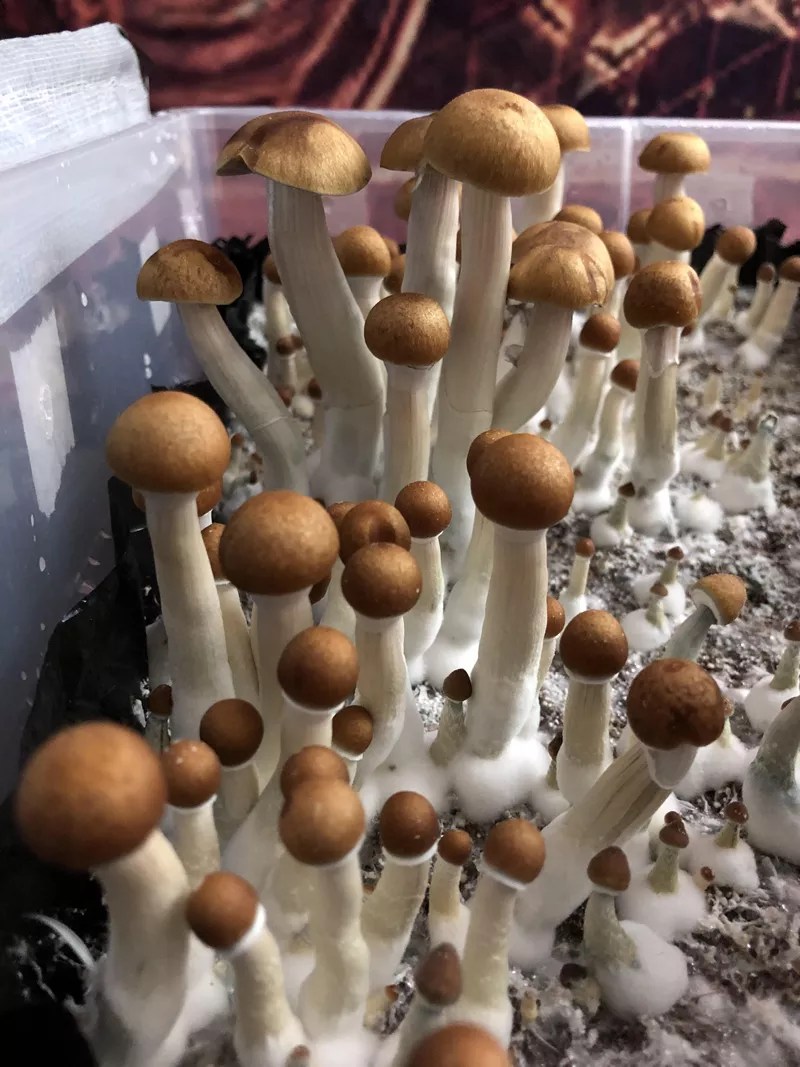
Anthony Camera

Audio By Carbonatix
Underground mushroom dealing is about to become a more stress-free profession in Denver, according to one dealer.
“I’m not going to have to worry at all,” says Douglas, who asked to remain anonymous.
That’s because on Thursday, May 16, the city’s psychedelic mushroom initiative, which decriminalizes growth, possession and consumption, will officially kick in. Although the recently passed ballot initiative doesn’t cover dealing, Douglas isn’t concerned about possibly getting in trouble, because he’s already identified what he considers a loophole.
Douglas doesn’t take cash for deals, instead handling all his payments electronically. Soon, if he’s caught dealing to someone, he can just pretend the mushrooms are his or the receivers’ personal stash, he explains. “I’ve got mushrooms on me, somebody has mushrooms on them. Neither one of us has to say I’m giving it to the other.”
The hypothetical scenario could play out in his favor…or not. The Denver City Attorney’s Office, Denver Police Department and Denver City Council are still mulling over the initiative, the first in the country to decriminalize psilocybin. Council could alter the initiative should any unintended consequences arise, and the city attorney’s office is in the process of defining “personal” use and coming up with guidelines for law enforcement.
In the meantime, at least for his part, Douglas says life just got a little easier.
Douglas’s day job is in the cannabis industry, and he supplements his regular income with the money he makes from pushing psilocybin. He says he’s never felt like he’s committing a crime.
“Morally or ethically, I’m not doing anything wrong, because psilocybin is medicine,” Douglas says. “The only thing that could be wrong is maybe if I gave it to somebody who wasn’t educated on use and took too high of a dose and put himself in danger. But most people are educated. And a lot of that is out of my control.”
In December 2017, just as conversations around decriminalization of mushrooms in Denver were beginning, Douglas started looking into growing them at home. He opted to grow larger quantities to sell rather than smaller quantities for personal use.
“There are easier methods of growing than the one that I chose. I just knew right away that I wanted to get into bulk growing,” says Douglas, who spoke with Westword through an encrypted communication app.

Douglas wants to produce two pounds of dried mushrooms per harvest.
Anthony Camera
Psychedelic mushrooms are in high demand in Denver, especially among frequent concert attendees, according to Douglas. But supply is relatively limited, since users either have to grow them or get them through a dealer.
Given the supply-and-demand imbalance, Douglas sells his product at a premium. Whereas an ounce of cannabis flower might go for $90, Douglas sells an ounce of his mushrooms for $200 (though he says he’s open to negotiation). Douglas sells a standard dose for someone wanting to trip – an eighth of an ounce – for $30, and also makes chocolate bars and capsules with ground-up mushrooms for microdosing. “My rates are higher than other people’s because I do some extra things that are kind of like added value.”
Douglas says that he spent about $600 on getting started, which included buying equipment, growing containers, spores and nutrients.
“If you’re somebody just wanting to do personal use, an ounce or less [per harvest], you can do that with like 100 bucks,” he says.
At first, not everything went smoothly. He said that he made mistakes and that some of his growing containers got contaminated. But he covered his overhead costs in about two months.
He’s been producing between a quarter- and a half-pound of dry mushrooms every month to month and a half, grossing about $800 per month in sales. He recently invested in new equipment that can fit more growing containers so that he’ll be producing two pounds in that amount of time. “After that is fully operational, I could be making $2,000 per month.”
This supplementary income is important for Douglas. “Denver is fucking expensive. I want to be saving money and spending money on shit that will further actualize myself, allow me to have a better lifestyle. Even better than that, I’m growing psilocybin, which so many people can benefit from. So for me, it’s a win-win.”
Douglas knows that he could still get into trouble if he’s caught dealing. That’s why he communicates with clients through encrypted messaging.
At the same time, he says the risk of actually getting arrested for dealing has been low. From 2016 to 2018, of the 9,000-plus drug cases processed by the Denver District Attorney, only three related to psilocybin led to charges.
“I feel like growing is a relatively quiet thing. It doesn’t make a lot of noise, doesn’t make a lot of smells. It’s not like the neighbors are going to be aware of it,” says Douglas, who meets customers at locations near, but not at, his apartment building. Douglas finds clients through his work in the cannabis industry and through friends.
He says there’s a sense of camaraderie among the psilocybin dealers he knows.
“Just last week, I didn’t have any product. I called up one of my friends who cultivates as well. Through that connection, I helped him sell an ounce. I didn’t ask him for any of the money he made. I was just happy to help somebody else out,” Douglas says.
He expects more people to start selling mushrooms now that they’re decriminalized, but he doesn’t mind the competition.
“I don’t care if more people sell. People have the right to heal, which is the purpose of this medicine.”